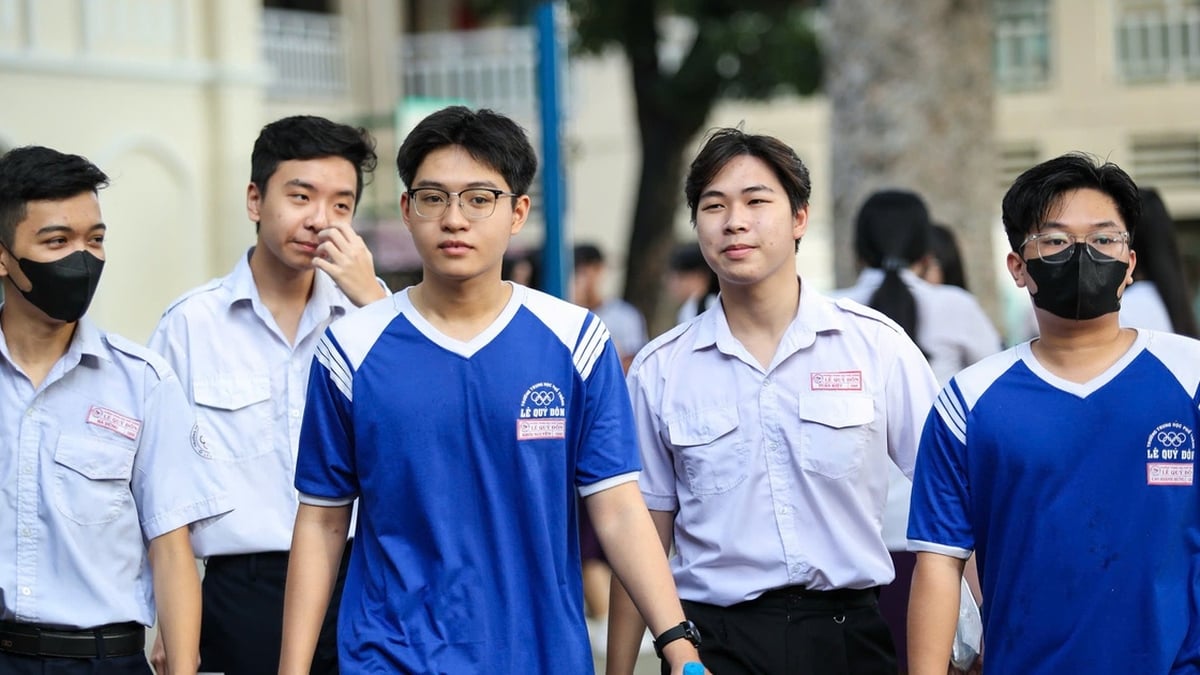On the morning of May 1, 1975, the song "As if Uncle Ho were here on the great victory day" by musician Pham Tuyen resounded on the waves of Liberation Radio to all parts of the country. That melody was like the joyful cry of the entire nation, carrying with it the choking emotion and deep pride on the day the country was reunited.
Half a century has passed, musician Pham Tuyen has hundreds of more works, but As if there were Uncle Ho on the great victory day , it remains an immortal song, the joyful cry of the nation on the day of reunion.

The song by musician Pham Tuyen is called "As if Uncle Ho were here on the day of great victory".
However, it is interesting that over the years, many people have confused the song's name with the familiar first line: " Like having Uncle Ho on the day of great victory" . In fact, this is just the opening line of the song, repeated over and over again like a refrain engraved in the listener's mind.
The official name of the song is Like having Uncle Ho on the great victory day, named by musician Pham Tuyen and announced on Voice of Vietnam radio on April 30, 1975.
The song " As if Uncle Ho were here on the great victory day" is only less than 60 words in both title and lyrics, with a simple, familiar melody and short, concise lyrics. Because of this conciseness, the song's name is often identified with the emotional opening line.
Musician Pham Tuyen said he has never felt uncomfortable about this common confusion. For him, what is more important than the correct name is the respect and affection that the public has for the song. As long as the melody, lyrics and emotions of the song still resonate in the hearts of every Vietnamese person, that is the greatest happiness for an artist.
The story of the birth of Nhu Co Bac on the day of the great victory is as miraculous as its vitality. Few people expected that the song was not written on April 30th, but was conceived and completed in a moment of intense inspiration on the night of April 28th, 1975.
Musician Pham Tuyen, then Head of the Arts Department of the Voice of Vietnam (VOV), recalled: "On the night of April 28, 1975, when I heard the news bulletin announcing that a Saigon military pilot (Nguyen Thanh Trung) had dropped a bomb on Tan Son Nhat airport, my emotions surged with the premonition that it wouldn't be long before Saigon and the entire South would be liberated!"

Musician Pham Tuyen.
It was the strong premonition that the day of total victory was approaching that urged the musician to compose. Although he was drafting a massive choral piece as assigned, he decided to stop, because he thought that on the day of liberation, people would pour out into the streets to cheer and no one would stay home to listen to the choir.
On the night of April 28, 1975, from about 9:30 pm to 11 pm, in less than two hours, musician Pham Tuyen finished writing the melody and lyrics of the song without having to change a single word. His wife recalled that special moment: in the cramped house, he had to stand at the top of the stairs, where there was a light, holding a piece of paper and a pencil so as not to disturb his wife and children's sleep.
The musician shared that the song was born "like a joyful cry", a very short song. "When I finished writing this song, I felt like I had paid off the "spiritual debt" that I had been struggling with for a whole month."
He had a strange feeling that "the song was already there, if not me, then another musician would have written it". He believed that the song was born not only from that moment of inspiration but also "plus his whole life" - a whole life of attachment, suffering and hope with the people and the country.
At noon on April 30, when the South was completely liberated, musician Pham Tuyen brought the song to meet Voice of Vietnam Radio General Director Tran Lam at the office stairs. As soon as they met, he started singing. The song moved Mr. Lam and he immediately played it in the special news bulletin that afternoon.
The song quickly became a resounding cheer throughout the country. On the historic day of April 30, the song was played more than 40 times on Voice of Vietnam Radio, after each victory news report. On the morning of May 1, the song continued to be played on Liberation Radio, along with “The Country is Full of Joy” by musician Hoang Ha.
According to musician Pham Tuyen, the song’s vitality was beyond his imagination. The melody not only resonated during major holidays in Vietnam, but also spread to many countries such as Japan, Russia, Germany, Cuba, China, etc.
Like having Uncle Ho in the great victory day is not only a historical song but also a part of the "treasure" carefully preserved by musician Pham Tuyen. Hundreds of songs in his huge collection are kept in a handwritten book compiled by himself. This is a priceless keepsake. Each song is carefully annotated by him, with additional information added each year, and some pages even have illustrations of royal poinciana flowers, traffic lights... according to the song title. The table of contents of the book is also written by him himself.
In particular, on the page where he copied the song "As if there was Uncle Ho on the great victory day ", musician Pham Tuyen respectfully framed a line recording an important milestone: "Labor Medal 3 awarded by the State Council on April 30, 1985" .
This detail shows that the song not only has a strong vitality in the hearts of the people but is also recognized by the State with a noble medal, exactly 10 years after it first sounded on the radio.
Since its inception, As if Uncle Ho were here on the great victory day has been considered a symbol of a triumphant song honoring victory, a song of victory day, and also a profound gratitude to President Ho Chi Minh . Musician Pham Tuyen considers this "the greatest reward" and "the most unforgettable memory" in his composing career.
The birth and vitality of the song met with “heavenly time, favorable terrain, and harmony of people” as its author once commented. As if Uncle Ho were here on the day of great victory , it will forever be one of the immortal epics, the pride of revolutionary music and live forever in the hearts of every Vietnamese person.
Source: https://vtcnews.vn/nhu-co-bac-trong-ngay-dai-thang-hay-nhu-co-bac-ho-trong-ngay-vui-dai-thang-ar940253.html





























![[Photo] National Assembly Chairman Tran Thanh Man visits Vietnamese Heroic Mother Ta Thi Tran](https://vphoto.vietnam.vn/thumb/1200x675/vietnam/resource/IMAGE/2025/7/20/765c0bd057dd44ad83ab89fe0255b783)




































































Comment (0)